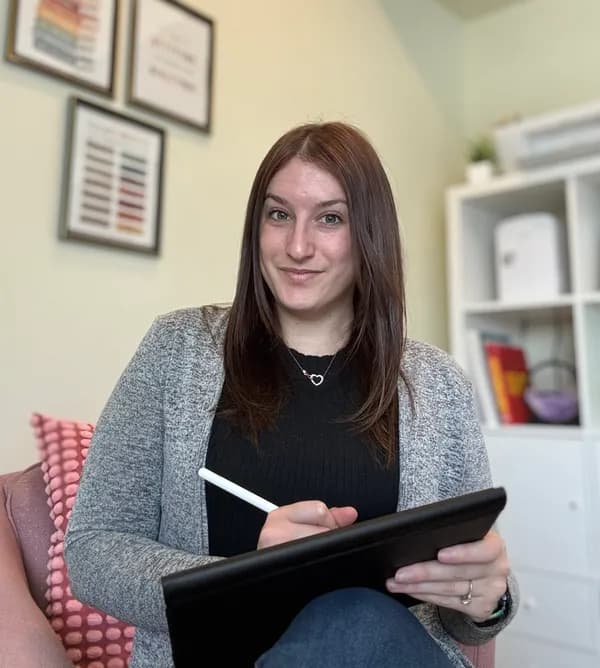Therapy for sex addiction

Something that once felt private now takes more time and energy than you ever intended. You may watch pornography, seek encounters, or message strangers even after promising yourself you would stop. The secrecy is exhausting and the shame is heavy. You may have put your relationship, job, or well-being at risk, yet the urge still pulls you back. This is not about a strong sex drive. It is about behaviour that feels out of control. You do not need to face this alone. Therapy can help you understand the patterns and build a healthier relationship with sexuality and intimacy.
When sexual behaviour becomes compulsive
Understanding the pattern
Sex addiction, also called compulsive sexual behaviour disorder or hypersexual disorder, isn't about how much sex you have or what you're interested in. It's about loss of control. You've tried to stop or cut back but can't. Sexual thoughts dominate your day. You spend increasing amounts of time seeking sexual experiences, engaging in sexual activity, or recovering from the consequences. You continue despite serious negative effects on your relationships, work, finances, or health. The behaviour often escalates over time, requiring more intensity or risk to achieve the same effect.
The hidden struggle
Sex addiction thrives in isolation and secrecy. You might be watching pornography for hours while your partner sleeps. You might be having affairs, using sex workers, or engaging in anonymous encounters while maintaining the appearance of a normal life. You could be compulsively masturbating to the point of physical injury or missing work and obligations. You might be engaging in increasingly risky behaviour: unprotected sex, illegal activities, or situations that could lead to arrest or harm. The gap between your public self and private behaviour creates profound shame and anxiety.
How common is this
Compulsive sexual behaviour disorder affects an estimated 3-6% of adults, though exact prevalence is difficult to measure due to shame and underreporting. Men report higher rates than women, though this may partly reflect gender differences in help-seeking behaviour. The widespread availability of internet pornography has contributed to rising concerns about problematic sexual behaviour, particularly among younger people. What matters is that many people struggle with this, and effective treatment exists.
Understanding compulsive sexual behaviour
Sources: Kowalewska et al., 2020 and Grant et al., 2025.
Different manifestations
Compulsive sexual behaviour takes many forms. Some people struggle with pornography use that has escalated in frequency, duration, or content. Others have serial affairs or anonymous sexual encounters. Some compulsively use dating or hookup apps. Others visit strip clubs or hire sex workers despite wanting to stop. Compulsive masturbation can become time-consuming and physically damaging. Some people engage in exhibitionism, voyeurism, or other paraphilic behaviours. Cybersex, sexting with strangers, or spending money on cam sites can become compulsive. The common thread is behaviour that feels driven rather than chosen, continues despite consequences, and is followed by shame and promises to stop.
The damage of compulsive sexual behaviour
Relationship betrayal and loss
When a partner discovers the behaviour, the hurt can be overwhelming. The lies and secrecy can shatter trust and create symptoms similar to trauma. Some relationships end, while others need significant repair. People who are single may also struggle to form real emotional connections because the compulsive behaviour gets in the way of genuine intimacy.
Health and legal risks
Risky sexual activity increases the chance of infections and can lead to legal trouble, such as soliciting or public acts. Some people face job loss after viewing sexual content at work. Money problems can appear due to spending on sex workers or online services. Physical injuries can also occur and may require medical care.
Shame and mental health
The internal conflict between your values and your behaviour creates profound shame. You might feel like you're living a double life, constantly anxious about discovery. Depression, anxiety, and suicidal thoughts are common. Self-esteem erodes as you repeatedly fail to control behaviour that violates your own values. The shame prevents you from seeking help, creating a vicious cycle where isolation and secrecy fuel more compulsive behaviour.
How therapy addresses compulsive sexual behaviour
Why specialized treatment is essential
Sex addiction recovery requires a therapist who specializes in this area and won't judge you. They understand that compulsive sexual behaviour often develops as a coping mechanism for trauma, attachment issues, intimacy fears, or emotional pain. They know how to help you identify triggers, understand the function the behaviour serves, develop healthier coping strategies, and address underlying issues. They can distinguish between sex addiction and high libido, paraphilias, or other concerns. They also understand how to work with couples when a partner has been affected by your behaviour.
What treatment involves
Therapy begins with honest assessment of your sexual behaviour, its impact, and what drives it. Your therapist will help you understand the cycle: trigger, ritual, acting out, and shame. You'll learn to identify high-risk situations and develop strategies to interrupt the cycle before acting out. Treatment addresses both stopping harmful behaviour and understanding why you've been engaging in it. This might include exploring early experiences, attachment patterns, trauma, or core beliefs about yourself. The goal isn't to eliminate sexuality but to develop a healthy, integrated relationship with it.
Evidence-based treatment approaches
Cognitive behavioural therapy
CBT helps you identify the thoughts and beliefs that drive compulsive sexual behaviour: "sex is my most important need," "I can't cope with stress any other way," "I'm unlovable and sex is how I get connection," or "I deserve to feel good after a hard day." You'll learn to challenge these beliefs and develop alternative coping strategies. CBT teaches skills for managing urges, avoiding triggers, and interrupting the cycle before acting out. Research supports CBT as effective for compulsive sexual behaviour. Treatment outcomes study.
Trauma-informed therapy
Many people with sex addiction have histories of sexual abuse, emotional neglect, or attachment trauma. Compulsive sexual behaviour often serves as an attempt to manage unprocessed trauma or recreate traumatic experiences in an effort to gain control. Trauma-focused approaches like EMDR or prolonged exposure can help you process these experiences so they no longer drive your sexual behaviour. Healing trauma is often essential for lasting recovery.
Acceptance and commitment therapy
ACT helps you clarify your values and commit to behaviour aligned with them, even when experiencing strong urges. Rather than trying to eliminate sexual thoughts and feelings, you learn to observe them without acting on them. You develop psychological flexibility to tolerate discomfort without turning to compulsive behaviour. This approach is particularly helpful for managing shame and building a life worth living beyond symptom reduction.
Attachment and relationship work
Sex addiction often reflects difficulty with emotional intimacy and secure attachment. You might use sex to avoid genuine connection, seek validation you didn't receive in childhood, or recreate familiar patterns of rejection. Therapy helps you understand your attachment style, develop capacity for emotional intimacy, and learn to get your needs met through authentic relationships rather than compulsive sexual behaviour.
Couple therapy for betrayal trauma
If you have a partner, they've likely experienced significant trauma from your behaviour. Couple therapy with a specialist in sex addiction and betrayal trauma can help rebuild trust, improve communication, establish boundaries, and address the attachment injuries your behaviour created. This work typically happens alongside individual therapy. Some relationships recover; others don't. Either way, addressing the relational impact is important for everyone's healing.
The recovery journey
Disclosure and assessment
Your first sessions require complete honesty about your sexual behaviour, even the parts that bring the most shame. Your therapist has heard it before and won't judge you. They'll assess the severity of your compulsive behaviour, screen for co-occurring issues, identify immediate safety concerns, and help you understand what recovery will involve. If you're in a relationship, your therapist will help you consider whether, when, and how to disclose to your partner, and coordinate couple therapy if appropriate.
Stabilization and sobriety
Early recovery focuses on establishing sexual sobriety based on boundaries you and your therapist define together. This might mean no pornography, no affairs, no anonymous encounters, or other specific commitments. You'll identify triggers, develop coping skills, and interrupt the acting-out cycle. This phase is often difficult as you're giving up your primary coping mechanism without yet having solid alternatives. Withdrawal symptoms like anxiety, irritability, and depression are common. Your therapist supports you through this while addressing the underlying issues.
Integration and authentic intimacy
As you maintain sobriety and develop healthier coping strategies, therapy shifts to deeper work on trauma, attachment, shame, and core beliefs. You'll explore what drove your compulsive behaviour and build the capacity for genuine intimacy. This includes developing a healthy sexuality that's integrated with your values rather than split off and shameful. You'll learn to connect with others authentically, tolerate vulnerability, and meet your emotional needs in relationships. Recovery isn't just about stopping problematic behaviour; it's about building a fulfilling life.
Find a therapist for sex addiction
Choosing the right therapist matters. Each province in Canada has its own regulations, which is why working with a recognized professional can make a real difference in your care. Stellocare takes the uncertainty out of the process by listing only verified therapists you can trust.
The right therapist for you
No therapists found with these specialties in Ontario.
Try selecting a different province.Resources and strategies
Support and information
Centre for Addiction and Mental Health (CAMH) — Sexual Behaviours Clinic
Out-patient assessment and treatment in Ontario for individuals (18+) concerned about sexual interests or behaviours that could lead to legal or personal harm. Includes family support. Learn more.
Campus Mental Health – Toolkit on Compulsive Sexual Behaviour
A toolkit developed for Canadian post-secondary settings, explaining compulsive sexual behaviour (CSB/out-of-control sexual behaviour) with signs, supports and links. Access toolkit.
Steps toward recovery
Creating barriers to acting out
- Install filtering software: use Covenant Eyes, Net Nanny, or similar software on all devices. Have someone else set the password. These tools monitor and block pornography and send accountability reports.
- Remove privacy opportunities: keep computers in public areas of your home, leave bedroom and bathroom doors open, avoid being alone for extended periods during high-risk times.
- Delete apps and accounts: remove dating apps, hookup apps, adult content accounts. Delete browsing history and saved contacts related to acting out behaviour.
- Change routines: if you act out at certain times or places, alter your schedule to eliminate those opportunities.
Understanding your cycle
- Map your triggers: keep a journal of situations, emotions, and thoughts that precede acting out. Common triggers include stress, boredom, loneliness, anger, shame, and fatigue (remember the acronym BLAST).
- Identify your ritual: notice the steps leading up to acting out. It might start hours before with seemingly innocent decisions. Recognizing early steps gives you more opportunities to interrupt the cycle.
- Name the function: ask yourself what need the behaviour meets. Comfort? Escape? Validation? Excitement? Understanding the function helps you find healthier alternatives.
Managing urges without acting out
- Reach out immediately: call your therapist, sponsor, or accountability partner when urges arise. Don't wait until after you've acted out. The connection itself often reduces the urge.
- Get out of isolation: go to a public place, call someone, or join others. Acting out requires privacy and secrecy. Breaking isolation breaks the cycle.
- Surf the urge: urges peak and then decrease if you don't act on them. Notice the physical sensation, name it, and wait it out without judgment.
- Use incompatible behaviour: do something that makes acting out impossible. Go for a run, take a cold shower, work with your hands, or engage in vigorous physical activity.
Covenant Eyes and AccountabilityApp provide monitoring and filtering with accountability reports sent to a partner or sponsor. Fortify is a comprehensive program for pornography addiction recovery. Strides or Habitica can help you track sobriety days and build positive habits.
Questions about sex addiction recovery
How do I know if I'm addicted or just have a high sex drive
A high sex drive means you enjoy sex often but it does not create problems or feel out of control. Addiction means the behaviour continues even when it causes harm, feels hard to stop, becomes a way to escape emotions, and leaves you with shame. If you want to stop but cannot, it is likely addiction rather than high libido.
Do I have to tell my partner everything
This depends on your situation and is best done with your therapist. Many couples need some level of disclosure to heal, but the timing and details matter. Guided disclosure with a therapist trained in sex addiction and betrayal trauma is safer than confessing on your own. Your partner deserves honesty, and a therapist can help you share it in a supportive way.
Does recovery mean I can never have sex again
No. Recovery is about creating a healthy and balanced sexual life. Early on, your therapist may suggest a short break from sexual activity to interrupt the compulsive pattern. Over time, you will rebuild a healthier form of sexual expression that aligns with your values and, if you have a partner, supports real intimacy.
Will my relationship survive this
Some relationships continue and others do not. The hurt your partner feels is real and recovery requires honesty, boundaries, and consistent change. Even with this effort, your partner may still choose to leave. Focus on your healing regardless of the outcome. If the relationship continues, rebuilding trust will take time and support.
What if I relapse
Relapse is common in early recovery. It does not erase your progress. What matters is reaching out for support, understanding what led to it, and adjusting your plan. Each setback teaches you about your triggers. Many people who are stable today had relapses at the beginning, and over time the urges become easier to manage.
Related concerns
References
- Kraus, S. W., Voon, V., & Potenza, M. N. (2016). Should compulsive sexual behavior be considered an addiction? Addiction, 111(12), 2097-2106. Retrieved from https://pubmed.ncbi.nlm.nih.gov/26893127/
- Centre for Addiction and Mental Health. Sexual Behaviours Clinic. Retrieved from https://www.camh.ca/en/patients-and-families/programs-and-services/sexual-behaviours-clinic
- Wéry, A., & Billieux, J. (2017). Problematic cybersex: Conceptualization, assessment, and treatment. Addictive Behaviors, 64, 238-246.
- Giugliano, J. R. (2009). Out of control sexual behavior: A qualitative investigation. Sexual Addiction & Compulsivity, 16(4), 361-375. Retrieved from https://www.researchgate.net/publication/247501754_Out_of_Control_Sexual_Behavior_A_Qualitative_Investigation
- Carnes, P. (2001). Out of the Shadows: Understanding Sexual Addiction (3rd ed.). Hazelden Publishing.
- Steffens, B. A., & Rennie, R. L. (2006). The traumatic nature of disclosure for wives of sexual addicts. Sexual Addiction & Compulsivity, 13(2-3), 247-267.
- Sex Addicts Anonymous. Find a meeting. Retrieved from https://saa-recovery.org/
- Sex and Love Addicts Anonymous. Welcome to S.L.A.A. Retrieved from https://slaafws.org/
- Society for the Advancement of Sexual Health. Find a CSAT. Retrieved from https://www.sash.net/
- Association of Partners of Sex Addicts Trauma Specialists. Retrieved from https://www.apsats.org/
About Stellocare
Stellocare is a Canadian platform where you can find the best fit therapist for you. Search the right thperaists now by asking our AI, browsing our list, or finding our social workers for personal referral.

Jess McKenzie
Canadian Certified Counsellor

Natasha Elliott
Registered Psychotherapist (ON)

David Keddy-Stacey
Registered Psychotherapist (Qualifying) (ON)

Jonathon Zarb
Registered Psychotherapist (ON)

Shayesteh Zarieh
Registered Psychotherapist (Qualifying) (ON)

Yamila Luner
Canadian Certified Counsellor

Cameron Whatram
Registered Clinical Counsellor (BC)

Jessica Marshall
Registered Counselling Therapist (NS)

KATHY MOSBAUGH
Registered Psychotherapist (ON)

Alex Choi
Registered Social Worker (ON)

Danielle Van Alstine
Registered Psychotherapist (Qualifying) (ON)

Delia Petrescu
Registered Psychotherapist (ON)

Amelie Rossignol
Counselling Therapist (AB)

Stefania Bonanno
Registered Social Worker (ON)

Emily Duggan
Registered Psychotherapist (ON)

Shani Ellis-Alman
Registered Social Worker (ON)

Natalie Bender
Registered Psychotherapist (Qualifying) (ON)

Katharine Heimbigner-Tenor
Registered Provisional Psychologist (AB)

Andrea Laurie
Canadian Certified Counsellor

Mackenzie Fournier
Registered Psychotherapist (ON)

Jess McKenzie
Canadian Certified Counsellor

Natasha Elliott
Registered Psychotherapist (ON)

David Keddy-Stacey
Registered Psychotherapist (Qualifying) (ON)

Jonathon Zarb
Registered Psychotherapist (ON)

Shayesteh Zarieh
Registered Psychotherapist (Qualifying) (ON)

Yamila Luner
Canadian Certified Counsellor

Cameron Whatram
Registered Clinical Counsellor (BC)

Jessica Marshall
Registered Counselling Therapist (NS)

KATHY MOSBAUGH
Registered Psychotherapist (ON)

Alex Choi
Registered Social Worker (ON)

Danielle Van Alstine
Registered Psychotherapist (Qualifying) (ON)

Delia Petrescu
Registered Psychotherapist (ON)

Amelie Rossignol
Counselling Therapist (AB)

Stefania Bonanno
Registered Social Worker (ON)

Emily Duggan
Registered Psychotherapist (ON)

Shani Ellis-Alman
Registered Social Worker (ON)

Natalie Bender
Registered Psychotherapist (Qualifying) (ON)

Katharine Heimbigner-Tenor
Registered Provisional Psychologist (AB)

Andrea Laurie
Canadian Certified Counsellor

Mackenzie Fournier
Registered Psychotherapist (ON)

